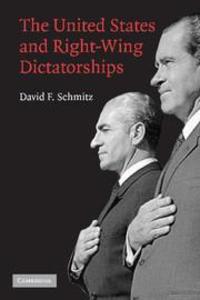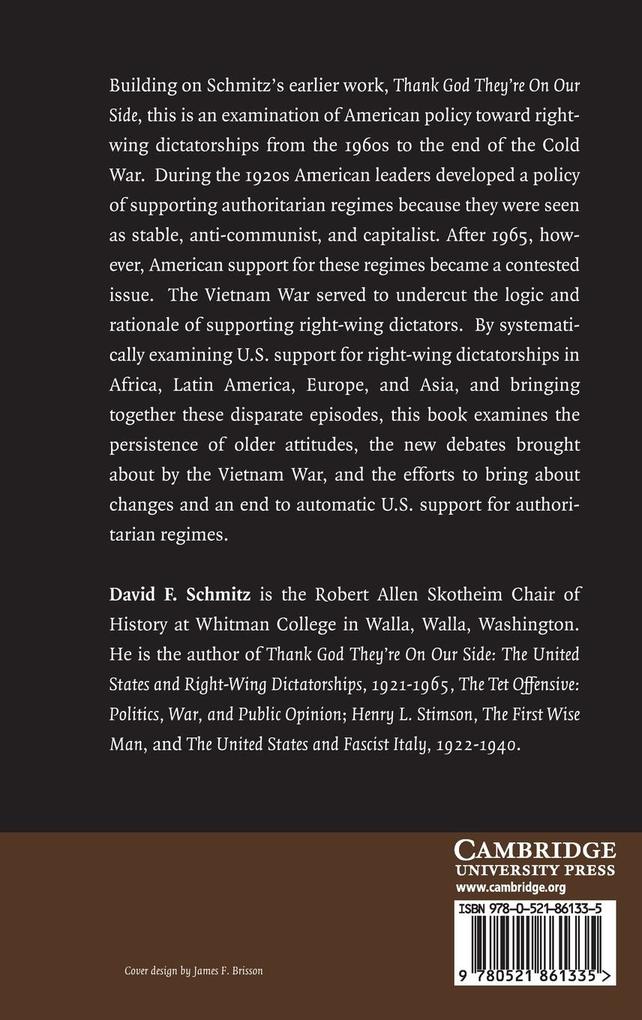
Zustellung: Mi, 11.06. - Sa, 14.06.
Versand in 1-2 Wochen
VersandkostenfreiBestellen & in Filiale abholen:
A comparative and comprehensive examination of American policy toward right-wing dictatorships in Africa, Latin America, Europe, and Asia from the 1960s to the end of the Cold War. It examines the debates and changes in American policy and attitudes toward authoritarian regimes that emerged after the Vietnam War. This led to a new framework built around human rights. While Ronald Reagan sought to reverse Carters policy, Congress and the American public opposed those efforts, leading to an end of automatic U.S. support for authoritarian regimes.
Inhaltsverzeichnis
1. No acceptable alternative: Mobutu in the Congo; 2. Degrading freedom: the Johnson administration and right-wing dictatorships; 3. Madmen: Richard Nixon, Henry Kissinger, and the quest for order; 4. Morality and diplomacy: the church committee and post-Vietnam foreign policy; 5. A fundamental tenet of foreign policy: Jimmy Carter and human rights; 6. What is the alternative?: the Reagan doctrine and authoritarian regimes; Conclusion.
Produktdetails
Erscheinungsdatum
04. Mai 2006
Sprache
englisch
Seitenanzahl
272
Autor/Autorin
David F. Schmitz
Verlag/Hersteller
Produktart
gebunden
Gewicht
625 g
Größe (L/B/H)
240/161/21 mm
ISBN
9780521861335
Entdecken Sie mehr
Pressestimmen
"This book is essential for understanding the central paradox of twentieth-century American foreign policy: why the world's oldest democracy repeatedly backed dictatorships in the name of freedom. Defenders of right-wing dictators argued they were a necessary evil. In his careful study of the collapse of the Cold War consensus since 1965, David Schmitz challenges the notion that this violation of core American values actually served U.S. interests. Friendly tyrants resisted necessary reforms and destroyed the political center, while the 'realist' policy of coddling dictators brought a backlash among foreign populations with long memories. A crucial insight into the uncertain status of America in the world today." Max Paul Friedman, Florida State University "A terrific follow-up volume to Thank God They're on Our Side, by one of our most discerning diplomatic historians. Schmitz lays bare the contradictions in U.S. policy vis-a-vis the developing world in the second half of the Cold War, and forces us to think anew about the price paid for support of dictators." Fredrik Logevall, Cornell University "Nowhere else is Schmitz's story as fully told or rendered with such verve. He shows how Washington's association with right-wing dictatorships has badly compromised the promotion of American values as a vital part of U.S. foreign policy." William O. Walker III, University of Toronto "Schmitz's riveting account of U.S. support of right-wing dictatorships and its tragic consequences for democratic institutions at home and abroad, is indispensable reading for anyone seeking to understand American foreign policy and the contemporary challenges to democracy." Penny Von Eschen, University of Michigan
Bewertungen
0 Bewertungen
Es wurden noch keine Bewertungen abgegeben. Schreiben Sie die erste Bewertung zu "The United States and Right-Wing Dictatorships, 1965-1989" und helfen Sie damit anderen bei der Kaufentscheidung.











